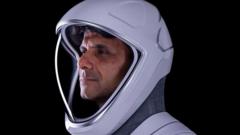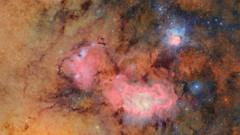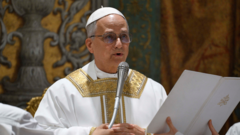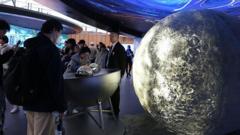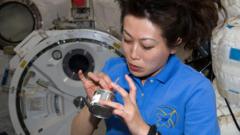**Jim Lovell's life story serves as an iconic narrative in the history of space exploration, demonstrating the indomitable human spirit in the face of adversity.**
**Jim Lovell, Apollo 13's Hero, Passes Away at 97: A Legacy of Courage and Inspiration**

**Jim Lovell, Apollo 13's Hero, Passes Away at 97: A Legacy of Courage and Inspiration**
**The legendary astronaut who faced unimaginable challenges in space and became a symbol of resilience has died.**
---
Astronaut Jim Lovell, renowned for his pivotal role in the Apollo 13 mission, has died at the age of 97. NASA commemorated Lovell's efforts in turning a near-tragedy into a remarkable achievement on April 11, 1970, when his spacecraft faced catastrophic failure while on its way to the Moon. Lovell and his two crewmates captivated tens of millions of viewers as they successfully splashed down in the Pacific Ocean, marking one of history's most celebrated moments in space travel.
Lovell, the first individual to embark on two lunar missions without actually landing, participated in the Apollo 8 mission prior to Apollo 13. Acting NASA administrator Sean Duffy stated that Lovell's contributions were instrumental in laying a "historic path" for America's space endeavors. A statement from Lovell's family reminisced about his unwavering positivity and humor, emphasizing how he inspired others to reach for the extraordinary.
Born on March 25, 1928, Lovell's early interactions with flight were profoundly shaped by the loss of his father. His family struggled financially, prompting him to enlist in the US Navy, where he was able to pursue a college education. Lovell's journey into the cosmos began when he joined NASA’s elite group of test pilots in 1962, eventually leading to significant voyages that pushed the boundaries of human space travel.
Lovell initially flew on Gemini 7, completing crucial long-duration spaceflight tests before leading Gemini 12 with fellow astronaut Buzz Aldrin, validating the effectiveness of extravehicular activities. His historic Apollo 8 mission became a light in a time of turmoil, as he and his crew made humanity’s first foray past the gravitational pull of Earth and captured the iconic “Earthrise” image during Christmas Eve 1968, an event that united people around the world.
However, it was Apollo 13 that brought Lovell into the mainstream spotlight. After an oxygen tank explosion crippled their spacecraft, Lovell’s calm leadership and ingenuity during dire circumstances captured a global audience that anxiously awaited their fate. His iconic words, "Houston, we've had a problem," echoed through living rooms everywhere as NASA’s dedicated flight controllers worked tirelessly to devise a plan for the astronauts' safe return.
In the years following his retirement from the Navy in 1973, Lovell enjoyed a quieter life, authoring books and giving motivational speeches on his remarkable career. His memoir, "Lost Moon: The Perilous Voyage of Apollo 13," inspired the award-winning film "Apollo 13," with Tom Hanks portraying him. Lovell famously stayed true to his naval roots, appearing in the film wearing his captain's uniform.
As we mourn the loss of Jim Lovell, the legacy of his courage and adventurous spirit will continue to inspire future generations exploring the vastness of space.
Astronaut Jim Lovell, renowned for his pivotal role in the Apollo 13 mission, has died at the age of 97. NASA commemorated Lovell's efforts in turning a near-tragedy into a remarkable achievement on April 11, 1970, when his spacecraft faced catastrophic failure while on its way to the Moon. Lovell and his two crewmates captivated tens of millions of viewers as they successfully splashed down in the Pacific Ocean, marking one of history's most celebrated moments in space travel.
Lovell, the first individual to embark on two lunar missions without actually landing, participated in the Apollo 8 mission prior to Apollo 13. Acting NASA administrator Sean Duffy stated that Lovell's contributions were instrumental in laying a "historic path" for America's space endeavors. A statement from Lovell's family reminisced about his unwavering positivity and humor, emphasizing how he inspired others to reach for the extraordinary.
Born on March 25, 1928, Lovell's early interactions with flight were profoundly shaped by the loss of his father. His family struggled financially, prompting him to enlist in the US Navy, where he was able to pursue a college education. Lovell's journey into the cosmos began when he joined NASA’s elite group of test pilots in 1962, eventually leading to significant voyages that pushed the boundaries of human space travel.
Lovell initially flew on Gemini 7, completing crucial long-duration spaceflight tests before leading Gemini 12 with fellow astronaut Buzz Aldrin, validating the effectiveness of extravehicular activities. His historic Apollo 8 mission became a light in a time of turmoil, as he and his crew made humanity’s first foray past the gravitational pull of Earth and captured the iconic “Earthrise” image during Christmas Eve 1968, an event that united people around the world.
However, it was Apollo 13 that brought Lovell into the mainstream spotlight. After an oxygen tank explosion crippled their spacecraft, Lovell’s calm leadership and ingenuity during dire circumstances captured a global audience that anxiously awaited their fate. His iconic words, "Houston, we've had a problem," echoed through living rooms everywhere as NASA’s dedicated flight controllers worked tirelessly to devise a plan for the astronauts' safe return.
In the years following his retirement from the Navy in 1973, Lovell enjoyed a quieter life, authoring books and giving motivational speeches on his remarkable career. His memoir, "Lost Moon: The Perilous Voyage of Apollo 13," inspired the award-winning film "Apollo 13," with Tom Hanks portraying him. Lovell famously stayed true to his naval roots, appearing in the film wearing his captain's uniform.
As we mourn the loss of Jim Lovell, the legacy of his courage and adventurous spirit will continue to inspire future generations exploring the vastness of space.





